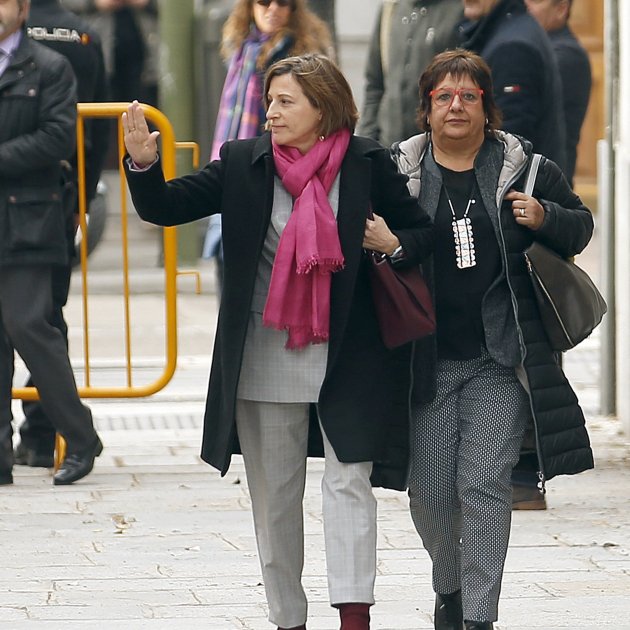Not every Spanish judge is willing to make the same interpretation of the new doctrine which the Supreme Court tailor-made for the Catalan political prisoners. This afternoon, a ruling in Barcelona penitentiary court number 1 refused to grant the public prosecutors' request to immediately suspend the open prison regime of former Catalan parliamentary speaker Carme Forcadell and former labour minister Dolors Bassa, ignoring the request of the Office of the Public Prosecutor. For the moment, the two women among the nine convicted pro-independence leaders can thus continue enjoying daytime prison leave.
On the other hand, a second judge who today reviewed the appeals against the third-level open prison regimes of ex-ministers Jordi Turull and Josep Rull did back the prosecutors' argument and thus provisionally suspended their third-level status, so they will be denied further daily leave after reentering prison tonight, as with the other five prisoners who are already back in Catalonia's Lledoners jail.
According to the judge's ruling on Forcadell and Bassa, the law only provides for precautionary suspension of leave provisions when the appeal is presented before the sentencing court - that is, the Supreme Court - not for a court of first instance, in this case the penitentiary surveillance court, which is hearing an appeal against a resolution of the Catalan justice administration. For this reason, it has given the two people affected ten days to file submissions on the prosecutors' appeal.
Clash with judge Marchena
This is the same argument used by the defence lawyer of former ANC president Jordi Sànchez to oppose - unsuccessfully - the suspension of the third level regime before a different prisons court, number 5. More importantly, though, the position taken by the judge of court number 1 on the female prisoners' status seems to break with the so-called Forcadell doctrine, imposed by the Supreme Court judge of the Catalan leaders' trial, Manuel Marchena, when Spain's highest court claimed its own right to decide on leave permissions and prison regimes of the prisoners, in a ruling on July 23rd withdrawing the work leave of the former parliamentary speaker.
The essence of the question now raised is as follows: did the Supreme Court really establish in its new doctrine that a prosecutor's appeal affecting the prison regime classification of the prisoners would automatically suspend the prisoners' leave regime? The Barcelona judge thinks not, understanding that the appeals against the third level regime do not require suspension of leave until the final pronouncement is given.
Reactions of Forcadell and Bassa
Both Forcadell and Bassa reacted to the decision in identical messages on Twitter in which they say that Barcelona penitentiary court number 1 has applied "what the law states". “And that’s why we are not entering prison,” they say.
"[We feel] terrible for our companions who are in prison, and for Josep Rull and Jordi Turull who are about to enter. We love you," they said.
What happens now?
It should be borne in mind that the rulings given in the last few days for all nine Catalan political prisoners are provisional. That is, both for the seven who have now been ordered back to prison, and for the two who will still continue their daily leave. The difference in criteria between the two Barcelona penitentiary courts means, though, that the male prisoners will await the final decision on their prison regime with all leave provisionally suspended, while the women will do so with their rights to leave prison daily still, for the moment, intact.
